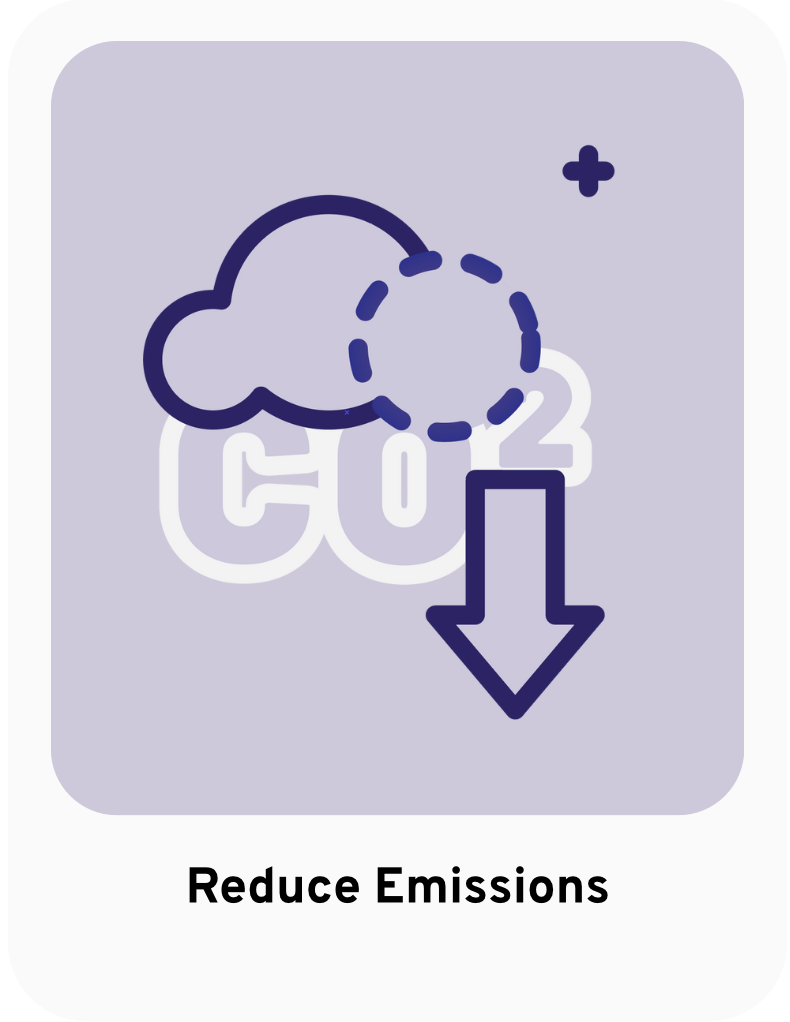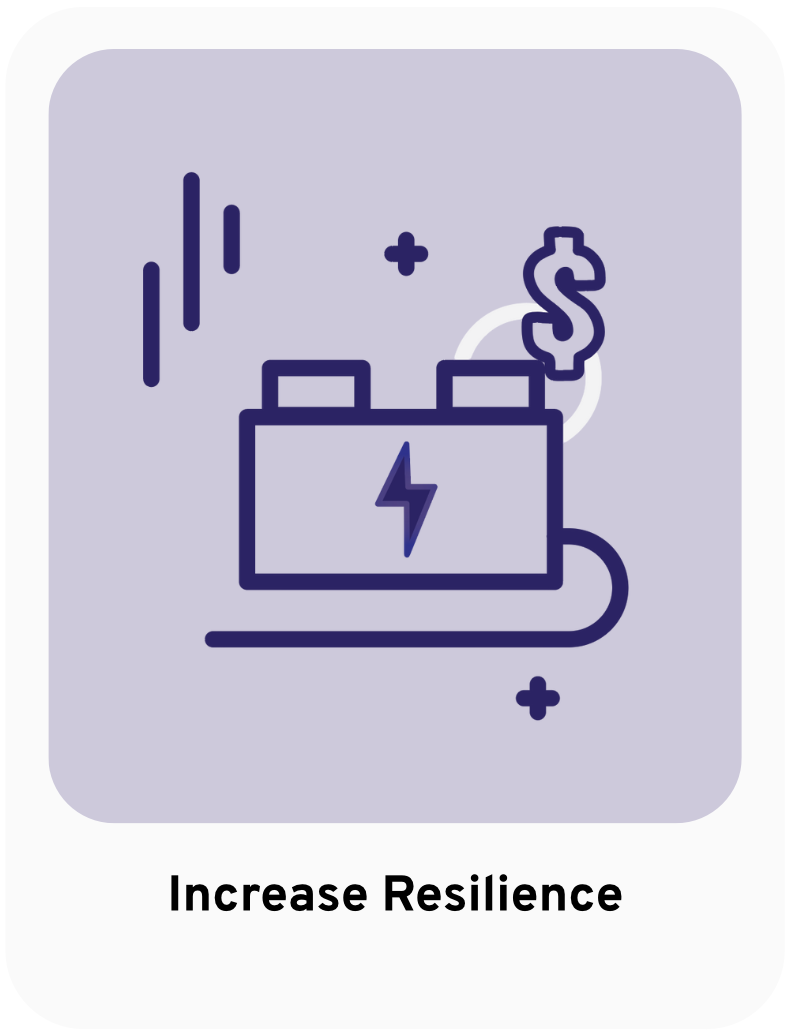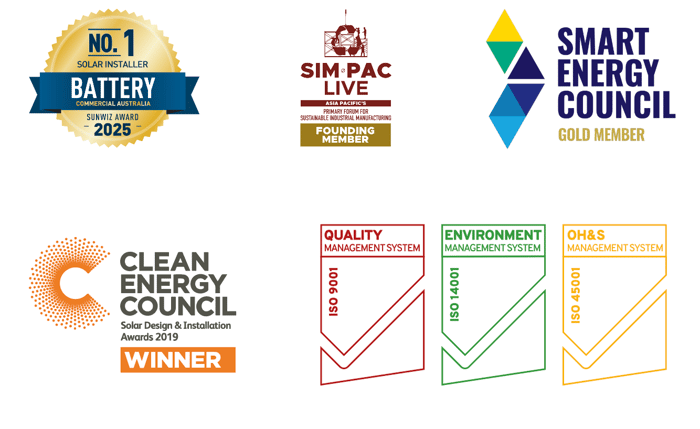Request an energy analysis
How Much Could Solar & Storage Save You?
Find out with a FREE Energy Analysis
For many Australian businesses, electricity is one of the biggest overheads – but it doesn't have to be.
On average, our customers reduce their energy bills by around 30% with solar alone, and up to 80% with solar and battery storage.
Find out how much you could be saving and take the first step towards smarter energy.
Upload your most recent energy bill today to get started.
Let's get started!
Australia's Biggest Brands Trust Smart
How Can Solar & Storage Help You Meet Your Goals?
We've worked with thousands of businesses to future-proof their profitability. Here's how.

On average, our customers reduce their energy bills by 30% with solar alone, and up to 80% with solar and battery storage.
With $0 upfront options available, smart businesses are protecting their profits from future price hikes with clean, cheap, abundant solar power.

Looking for ways to reduce your carbon footprint which are meaningful, long-lasting and cost effective?
Look no further.
Generating your own renewable energy on-site is one of the most popular ways Australian businesses are reducing their emissions, in line with new reporting requirements.

Nobody likes nasty surprises in business.
Blackouts, brownouts and unexpected price hikes can seriously hurt your bottom line, but solar and battery storage can mitigate these scenarios and make your business more resilient in the short and medium term.
Commercial Solar FAQs
Why should I install solar?
As electricity prices continue to rise, all businesses should be looking to reduce their energy consumption and electricity spend wherever they can. A commercial solar system is a great way to do this in an economical way, without having to change the way your business operates. Stakeholder expectations have also changed, and embracing renewable energy is a fantastic way to demonstrate your commitment to sustainability while modernising your business.
How does commercial battery storage work?
Commercial battery storage takes electrical energy from the grid or solar panels and stores it as chemical energy in batteries. This stored energy can be discharged back into the electrical system when required, providing businesses with greater flexibility and control over their energy usage.
What kind of solar system suits my business?
There’s no one-size-fits-all solar system that will suit all businesses. Getting the most out of your commercial solar system requires careful consideration of your premises and some creative thinking to take advantage of your physical space. There are multiple options to suit varying circumstances:
Rooftop: Rooftop solar systems are some of the most popular solar PV systems because they’re safe to install, easy to maintain and cause minimal disruption to operations during installation.
Ground Mount: Ground mount solar systems are a great way to turn unusable pieces of land into productive energy sources, especially if your roof structure is unsuitable for a rooftop system. Ground mount systems are also easy to operate and maintain.
Solar Car Shades: Solar car shades are an intelligent use of space that can deliver multiple benefits in a single form, including providing clean energy to adjacent buildings. These systems can also be modular and adaptable to suit any car park size.
Building Integrated: Building-integrated solar systems take this intelligent design approach to the next level, incorporating solar into the architectural structure such as replacement roofs.
Can I upgrade my system if my energy requirements increase?
Yes, you can upgrade your existing solar system if necessary. If your energy requirements have increased and your current system no longer meets your demand, consider upgrading your existing solar array. Upgrades may include adding additional panels, replacing existing equipment with more efficient models, or even expanding your system by adding additional technologies such as battery storage. Note that any upgrades must meet standards outlined by the policies of your state and network provider. The additions should work seamlessly with the existing panels, inverters, or battery storage.
We don't own our premises. Can we still get solar?
Yes, you can still get solar for your business if you're a tenant. In fact, the majority of our projects have been delivered for organisations who lease their premises, including My Muscle Chef, KFC and Officeworks.
For landlord's, there are benefits to having solar installed on their property, whether roof or ground mounted. These include:
- Installing commercial solar on your building can help make lease agreements more attractive and encourage tenants to stay longer.
- Buildings may see lower costs of capital and higher market value because of this reduced risk.
- Many businesses now have sustainability goals which encourages them to seek buildings with lower energy demands. This means you can potentially gain a higher rent in the future.
- The current tenant who purchases the system will be invested in the property and would not likely move quickly.
How much space will I need for a battery system?
Generally, a commercial battery has a compact design resembling a tall fridge. A 100-kilowatt-hour storage capacity would occupy a space of approximately 2m in height, 1m in width, and 1m in depth.
Lithium-ion batteries are space efficient as they have a wide temperature operating range, typically between 0°C to 38°C, making them suitable for outdoor installations. They are also more energy-dense than lead-acid batteries, meaning they occupy less space while delivering the same or even greater energy storage capacity.
How do we know if our business needs a battery?
For those who have already installed solar and seen the benefits, battery storage is the next logical step. As energy rates continue to drive uncertainty in the long-term view of Australia's energy market, battery storage uptake is increasing. Battery storage insulates a business from price volatility in one of its largest cost inputs and provides energy independence.
If you have seen a significant increase in your energy rates and already have solar, now is a good time to get a battery feasibility study to understand the latest numbers. Generating renewables during the day is no longer enough to meet a company's ambitious renewable targets and many are not happy to accept increased solar export when looking to expand their existing system. For organisations that need more on-site renewables (and that’s all of them) the right battery is critical in optimising the financial benefits and minimising the reliance on grid power.
What are the main applications of battery storage?
The most basic application of commercial battery storage is to discharge through night-time loads. However, that’s just one application of commercial battery storage. Other applications include:
Peak shaving: reducing electricity consumption during peak demand events when utility rates are much higher. By discharging stored energy during these peak hours, businesses can lower a significant charge that makes up their energy bill.
Load shifting: redistributing energy consumption from high-demand periods to low-demand periods. Battery storage systems allow businesses to store excess energy during off-peak hours and use it during peak hours, effectively reducing electricity expenses and supporting grid stability.
Microgrid: Commercial battery storage plays a crucial role in microgrid applications. Microgrids are localised energy systems that can operate independently from the main grid. By combining solar power with battery storage, businesses can create self-sustaining microgrids that provide reliable electricity, particularly in remote areas or end-of-grid locations.
Grid participation: The more sophisticated client may also want to dispatch their stored energy into the grid and participate in FCAS and NEM spot markets. By using your BESS (Battery Energy Storage Systems) in this way you can generate additional revenues outside of energy bill savings and improve your financial position.
This is an example solar frequently asked question module heading
This is an example paragraph section where you can talk about anything you want. It’s pretty cool right? Guess what! This is an example paragraph section where you can talk about anything.This is an example paragraph section where you can talk about anything you want. It’s pretty cool right?
What maintenance is required for solar systems?
Cleaning and debris removal: Dirt, dust, and debris can accumulate on panels over time, preventing them from absorbing sunlight effectively. While this is often washed away by rainfall, solar panels should be checked and cleaned regularly to prevent soiling.
Panel and system inspections: Regular inspections of panels and systems can help identify potential issues before they become major problems. This includes monitoring performance, assessing the condition of components, checking for damages, and replacing components if necessary.
Wiring and electrical system checks: Commercial solar systems are supported by an intricate network of wiring, and any loose connections can lead to a decline in performance. Regular visual inspections of fittings and cables are necessary to ensure that they are securely attached and free of damage.
System upgrades: Upgrading your solar panel system can boost its performance and efficiency. As new technology becomes available, it's worth considering an upgrade to ensure that your system is running at its best.
While some basic maintenance tasks can be done yourself, hiring a professional service provider may be necessary when dealing with the more challenging tasks that require specialized knowledge and equipment.
What finance options are available for commercial solar systems?
When considering how to pay for a solar system, a business has several options. These include:
- Capital Purchase (CAPEX);
- Payment Plan
- Power Purchase Agreement (PPA)
The financing option you choose will depend how your business compares its investments and risk profile.
industry recognition
Leading Commercial Energy Since 2013

Resources
Discover thought-leading articles, a huge range of case studies, product explainers and more.




.webp?width=78&height=64&name=Accor_2019_(dark_blue).webp)



